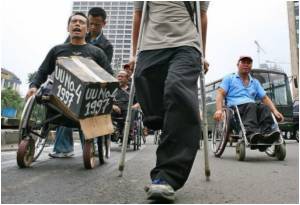
"California was once a national model for long-term care, but those services are being rolled back," said Kathryn Kietzman, the study's lead author. "Our system is far from perfect, but as our population ages, this isn't the time to take away the supports seniors depend on.
"A 20 percent cut in caregiver hours would be devastating to disabled seniors' health and well-being," she added. "And in the long run, it could cost the state more, because ailing seniors will end up in expensive emergency rooms, hospitals and nursing homes."
For the study, researchers spent a year following and documenting the lives of a typical group of seniors with disabilities who are enrolled in Medicare and Medi-Cal and receive in-home and community care in Los Angeles, San Diego, San Francisco and Santa Clara counties. The seniors depend on fragile networks of paid public programs and unpaid help to live safely and independently at home in spite of already limited caregiving hours.
Aging safely and independently at home is not only a strongly held desire of most Americans; the U.S. Supreme Court's decision in Olmstead v. L.C. and E.W. (1999) requires public programs to honor these desires when feasible, the study authors said.
The study found:
Advertisement
Older adults' health and abilities change continually, sometimes unpredictably. Most of the respondents' declines in health were slow to moderate, but for several, their health worsened dramatically in a short period. For instance, Michael, 74, depended on one IHSS caregiver for 40 hours a week to help manage his diabetes. But when Michael was alone, he could not give himself the appropriate medications and eventually had to move into a nursing home.
Advertisement
Seniors, families try to cobble together a support system to survive
Some older adults with disabilities need around-the-clock care, while others manage with a limited number of caregiver hours each week. Miriam, 81, suffered a massive stroke and manages a host of chronic diseases, including diabetes and high blood pressure. She uses a wheelchair, has minimal use of her arms and needs help to eat, dress, bathe, use the toilet and perform other tasks.
For more than a decade, Miriam has relied on various support networks, including an IHSS caregiver, a family caregiver partially paid by IHSS, and the help of extended family members. Miriam's six children helped cover the cost of her care, but when one daughter recently lost her job, Miriam used all her savings to pay for help. The family doesn't know how they will continue to pay for Miriam's care.
Recession, budgets cuts greatly impact low-income seniors
In addition to a possible 20 percent reduction in IHSS hours set to take effect on Jan. 1, 2012, seniors with disabilities are also faced with the downsizing and transition of Adult Day Health Care (ADHC) centers into a much reduced and yet-to-be defined program on Mar. 1, 2012. ADHC serves many seniors with Alzheimer's and other debilitating conditions. The Multipurpose Senior Services Program, which provides social and health care management for those who are certifiable for placement in a nursing facility but who wish to remain in the community, has also been reduced. And study participants who rely on supplemental security income checks experienced continued reductions in their cash assistance, forcing them to cut back on already meager budgets by reducing food purchases and making other cuts.
For Monique and her husband, the ADHC centers provide essential respite hours that allow them to work full time and care for Monique's mother, Yvette, 78. Yvette attends an ADHC center five days a week. Should the center close in the future due to budget cuts or reduce its hours, the couple is worried about who will care for Yvette and how they will pay for it.
The recession and continued economic downturn also has hurt the state's low-income seniors. Fran, 82, who has diabetes, fibromyalgia, osteoarthritis and a history of a brain tumor, was living in a home she owned when the study started a year ago. During the last interview with a researcher, she was facing foreclosure and was in search of affordable housing.
Consolidating programs, enhancing caregiver programs could improve long-term care
California has a system of fragmented and uncoordinated programs for older adults with disabilities that are difficult to navigate. The study's authors recommend establishing a single point of entry with a common eligibility and assessment process, such as the national Program of All-Inclusive Care for the Elderly (PACE), which pools Medi-Cal and Medicare funds. The Affordable Care Act has already designated four California counties to design innovative ways to coordinate long-term supports and services with the goal of a statewide program. The law could also better prepare, educate and engage both family caregivers and unrelated home-care workers, who are already overworked and underpaid.
"While it is challenging to contemplate transforming systems of care during difficult financial times, policy solutions should work toward a more person-centered and better organized approach to long-term services and supports for vulnerable Californians," said Dr. Bruce Chernof, president and chief executive officer of The SCAN Foundation. "California cannot simply cut its way out of this problem.
"We need to develop a network of community-based services and supports that focus on an individual's needs, values and preferences so that all who need daily support can access the right services — from the right provider, at the right time and in the right place."
Source-Eurekalert











